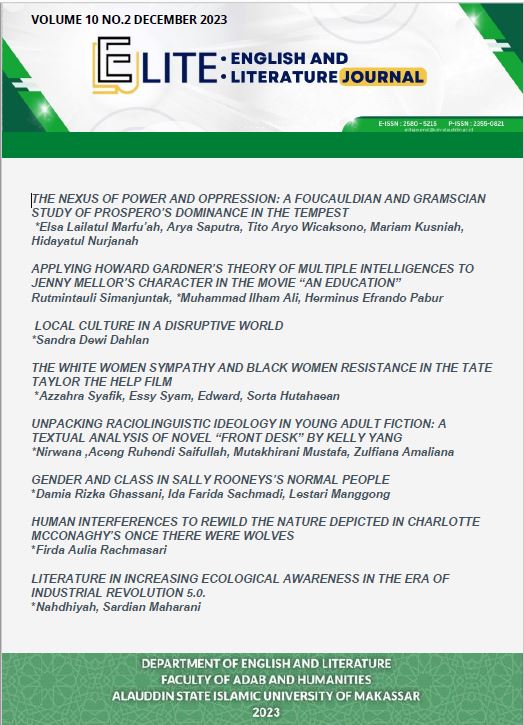THE NEXUS OF POWER AND OPPRESSION: A FOUCAULDIAN AND GRAMSCIAN STUDY OF PROSPERO’S DOMINANCE IN THE TEMPEST
Abstract
This study focuses on the intricate power dynamics and hegemonic structures in William Shakespeare’s The Tempest, focusing on Prospero’s dominion over his subordinated subjects, Ariel and Caliban. Drawing from Michel Foucault’s power relations and Antonio Gramsci’s hegemony, the study reveals that power within the narrative transcends physical coercion, encompassing the manipulation of cultural, political, and ideological elements. The findings unveil the complex interplay of forces governing authority, subjugation, and the imposition of cultural and intellectual control in the context of the master-slave relationship. Prospero, as the master, employs language and narrative manipulation to assert his dominance over Ariel and Caliban, yielding both physical and psychological control. The themes of oppression and colonialism within the play are distinctly portrayed, notably through the enslavement of Caliban and Ariel, emphasizing their resilience against prevailing power imbalances. Moreover, this research extends beyond Shakespeare’s work, functioning as a metaphor for contemporary societal challenges related to power, dominion, and resistance. Ultimately, the interplay of power and oppression within The Tempest provides a profound lens through which to examine the intricacies of power within the broader spectrum of human existence, enriching our understanding of power dynamics in literature and their significance in contemporary societal issues.
Downloads
References
Arcilla JR, F. E. (2023). Exploring the Dichotomy of Power and Oppression in William Shakespeare's The Tempest: A Formalistic Analysis. Journal of Namibian Studies: History Politics Culture, 34, 1016-1034. https://doi.org/10.59670/jns.v34i.2071
Adamson, W. L. (2014). Hegemony and Revolution: Antonio Gramsci's Political and Cultural Theory. Vermont: Echo Point Books & Media.
Bloom, H. (Ed.). (2008). Bloom’s Shakespeare Through the Ages: The Tempest. New York: Infobase Publishing.
Cheney, D. R. (1999). [Review of Shakespeare: The Invention of the Human, by H. Bloom]. Rocky Mountain Review of Language and Literature, 53(1), 103–105. https://doi.org/10.2307/1347964
Efrizah, D. (2018). Supernatural Power in William Shakespeare’s The Tempest. KnE Social Sciences, 266-277. https://dx.doi.org/10.18502/kss.v3i4.1938
Egan, G. (2007). Shakespeare. Edinburgh: Edinburgh University Press.
Femia, J. V. (1987). “The Concept of Hegemony’, Gramsci’s Political Thought: Hegemony, Consciousness, and the Revolutionary Process”. Oxford: Clarendon Press
Foucault, M. (1980). Power/Knowledge, Selected Interviews & Other Writings 1972-1977. London: Vintage.
Foucault, M. (1982). The Subject and Power. Critical Inquiry, 8(4), 777–795. http://www.jstor.org/stable/1343197
Gramsci, A. (1987). Selections from the Prison Notebooks. New York: International Publishers Co.
Holub, R. (1992). Antonio Gramsci: Beyond Marxism and Postmodernism. London: Routledge.
Ives, P. (2004). Language and Hegemony in Gramsci. London: Pluto Press.
Jannah, I. (2022). Power Relation in The Best of Me by Nicholas Sparks. Thesis. Malang: UIN Maulana Malik Ibrahim. http://etheses.uin-malang.ac.id/42775/1/17320038.pdf
Jones, S. (2006). Antonio Gramsci. Oxon: Routledge.
Klarer, M. (2013). An Introduction to Literary Studies. London: Routledge.
Krueger, S. H. (2010). The Tempest (Shakespeare Explained). Singapore: Marshall Cavendish Benchmark.
Lewis, J., & Jhally, S. (1994). The Politics of Cultural Studies: Racism, Hegemony, and Resistance. American Quarterly, 46(1), 114–117. https://doi.org/10.2307/2713361
Macey, D. (2004). Michel Foucault. London: Reaktion Books.
McHoul, A., & Grace, W. (2002). A Foucault Primer: Discourse, Power, and The Subject. London: Routledge.
Miles, M. B., & Huberman, A. M. (1994). Qualitative data analysis: An expanded sourcebook (2nd ed.). California: Sage Publications.
Mills, S. (2003). Michel Foucault. London: Routledge.
O’Farrell, C. (2005). Michel Foucault. London: SAGE Publications.
Oliver, P. (2013). Foucault - The Key Ideas (Teach Yourself). London: McGraw-Hill.
Santucci, A. A. (2010). Antonio Gramsci. New York: Monthly Review Press.
Sergiu, B. (2010). M. FOUCAULT'S VIEW ON POWER RELATIONS. Cogito: Multidisciplinary Research Journal, 55-61.
Skura, M. A. (1989). Discourse and the Individual: The Case of Colonialism in The Tempest. Shakespeare Quarterly, 40(1), 42–69. https://doi.org/10.2307/2870753
Smart, B. (2002). Michel Foucault. New York: Routledge.
Taylor, D. (Ed.). (2011). Michel Foucault: Key Concepts. Durham: Acumen.
Tuğlu, B. (2016). Identities in The Tempest, Tempests in Identities. International Journal of English and Literature, 7(5), 62-68. https://academicjournals.org/journal/IJEL/article-full-text-pdf/280722E58642
Valentine, J. (1998). Naming the Other: Power, Politeness and the Inflation of Euphemisms. Sociological Research Online, 3(4), 37-53. https://doi.org/10.5153/sro.184
Weller, B. (1982). Identity and Representation in Shakespeare. ELH, 49(2), 339–362. https://doi.org/10.2307/2872987
Copyright (c) 2023 Elsa Lailatul Marfu'ah, Arya Saputra, Tito Aryo Wicaksono, Mariam Kusniah, Hidayatul Nurjanah

This work is licensed under a Creative Commons Attribution-NonCommercial-ShareAlike 4.0 International License.
Once an article was published in the journal, the author(s) are:
granted to the journal right licensed under Creative Commons License Attribution that allows others to share the work with an acknowledgement of the work's authorship.
permitted to publish their work online in third parties as it can lead wider dissemination of the work.
continue to be the copyright owner and allow the journal to publish the article with the CC BY-NC-SA 4.0 license
receiving a DOI (Digital Object Identifier) of the work.


